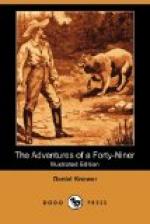There was a friend of mine named R., who owned a third interest in a factory that belonged to a relative of mine who got the gold fever when I did, and got me to negotiate the sale of his interest in it to him, which I did for $8,000, so he could go to California with me. When he arrived there he proposed to build a brewery. His father had been a brewer in Scotland. He bought a lot, a part of the city called Happy Valley, and started to build the first brewery on the Pacific coast. He commenced to build one that would cost $30,000 with that capital, which was his mistake. If he had commenced in a small way he would have made his fortune. (In my personal narrative he had much to do with my affairs.)
At this point in writing my manuscript, I have just heard of the death of Colonel Jonathan Stevenson, aged ninety-four, in California, to whom I had a letter of introduction from Governor William L. Marcy. I found him the warmest, the truest and most generous friend. He was a little unpopular when I first met him, for what I conceived the most noble action of his life. There were in his regiment roughs from the city of New York, where it was organized, who, when the war was over with Mexico, would go into saloons and places and help them selves to what they wanted and refused to pay. They were termed “The Hounds.” There was a vigilance committee organized against them, which public sentiment, at that time, fully indorsed. They had seized a number of them and were about to hang them. Colonel Stevenson faced the excited crowd and asked to have them give the men a trial and punish the guilty. He said that when he returned to New York and their mothers asked him what had become of their sons, how could he face them if they were put to death in that way; but if he could say to them that they had a fair trial, were found guilty of crime, and had been punished according to law, it would be different. I think they were not executed, but banished; but it set up a cry against the colonel that he had taken the part of “The Hounds,” so unjust is often, for a time, public sentiment. That was the first vigilance committee; the great one came afterward, but I am confined to the days of the “Forty-niners.”




